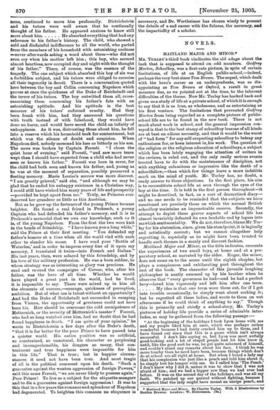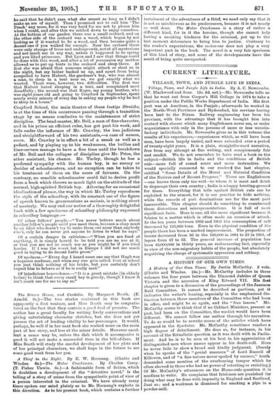* Maitland Major and Minor. By Charles Turley. With 6
Illustrations by
he said that he didn't care what she Meant as long as I didn't snake an ass of myself. Then I promised not to call him The Peach' any more, for it was very hard for me not to please him when I could, and after this we settled down to enjoy ourselves. At the bottom of our garden there was a small orchard, and on the other side of the orchard was a wood, which began by not looking as if it wanted to be a wood, and then became quite a decent one if you walked far enough. Near the orchard there were only stumps of trees and undergrowth, not at all mysterious and not much use in any way, unless it happened to be spring and you liked primroses. But Lyon and I saw that things could be done with this wood, and after a lot of persuasion my mother allowed us to put up tents in the orchard and sleep there. At first she was afraid that someone might attack or steal us in the night, but my father backed us up, and apart from being compelled to have Hubert, the gardener's boy, who was almost a man, to sleep in a tent near us, we got exactly what we wanted. There were, however, two difficulties. The first was that Hubert hated sleeping in a tent, and complained most dreadfully ; the second was that Roger, my young brother, who was eight years old and going to Crayford in September, spent nearly every minute of every day in asking my people why he had to sleep in a house."
Crayford School, the main theatre of these Iv.stige Streiche, is at the time of this occurrence passing through a transition stage by no means conducive to the maintenance of strict discipline. The head-master, Mr. Bell, a man of fine character, and in his prime an efficient ruler, has got past his work, and falls under the influence of Mr. Crawley, the less judicious and straightforward of his two assistants,—a case of nomen, omen. Mr. Crawley is in effect a bit of a sneak as well as a pedant, and by playing up to his weaknesses, the bullies and time-servers manage to have a fine time until the breakdown of Mr. Bell and the collapse of discipline give Mr. Price, the other assistant, his chance. Mr. Turley, though he has a profound sympathy with the human boy, is no enemy or derider of schoolmasters, and no exception can be taken to his treatment of them on the score of fairness. On the contrary, no sensible schoolmaster could fail to derive profit from a book which throws so much light on the attitude of the normal, high-spirited British boy. Allowing for an occasional idealisation of phrase, the way in which Mr. Turley reproduces the style of the schoolboy, with its constant use of the figure of speech known to grammarians as meiosis, is nothing short of masterly. We may end our notice of a thoroughly delightful book with a few specimens of schoolboy philosophy expressed in schoolboy language :—





















































 Previous page
Previous page